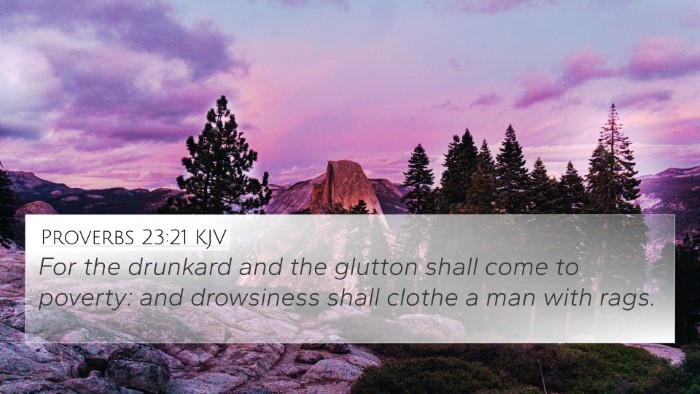Understanding Proverbs 19:15
Bible Verse: Proverbs 19:15 - "Laziness casts one into a deep sleep, and an idle soul will suffer hunger."
Summary of the Verse's Meaning
The verse from Proverbs 19:15 offers a potent insight into the consequences of laziness and idleness. It speaks to the dangers of inactivity and the inevitable repercussions that follow such a lifestyle. Through the metaphor of deep sleep, it suggests that laziness can lead individuals into a state of complacency, rendering them unaware of their surroundings and the needs of their lives. This idleness, in turn, brings about hunger—not just physically, but spiritually and emotionally as well.
Insight from Commentaries
- Matthew Henry: Henry emphasizes that the verse illustrates a common consequence of laziness—spiritual dullness and lack of productivity. He notes that those who are slothful not only miss out on the necessities of life but also the opportunities for spiritual growth.
- Albert Barnes: Barnes points out that idleness leads to suffering, suggesting that the natural outcome of neglecting responsibilities is a forfeiture of rewards and fulfillment. He connects this to the broader theme of industriousness present in Proverbs.
- Adam Clarke: Clarke expands on the idea that laziness is a moral failing that affects one’s character and ability to provide for oneself. He relates this back to sin's impact on the soul, stressing that one’s spiritual state can echo their physical habits.
Bible Cross-References
This verse connects with several other scripture passages that reinforce its message about laziness and its consequences:
- Proverbs 10:4: "He who has a slack hand becomes poor, but the hand of the diligent makes rich." - This verse highlights the contrast between diligence and laziness.
- Proverbs 12:24: "The hand of the diligent will rule, but the lazy man will be put to forced labor." - A continuation of the theme of the outcomes linked to one’s work ethic.
- Proverbs 13:4: "The soul of a lazy man desires, and has nothing; but the soul of the diligent shall be made rich." - A powerful interjection showing the desire and futility of the idle.
- Proverbs 14:23: "In all labor there is profit, but idle chatter leads only to poverty." - This verse directly complements the teaching of Proverbs 19:15 by showing the value of labor.
- 2 Thessalonians 3:10: "For even when we were with you, we commanded you this: If anyone will not work, neither shall he eat." - A New Testament connection confirming the biblical principle regarding work.
- Ecclesiastes 10:18: "Because of laziness the building decays, and through Idleness of hands the house leaks." - This illustrates the effects of laziness on one’s responsibilities.
- Proverbs 21:25: "The desire of the lazy man kills him, for his hands refuse to labor." - Illustrating the tragic consequences of neglecting duties.
Thematic Connections
Proverbs 19:15 can be understood within various themes present throughout scripture, particularly in relation to industriousness and moral accountability. Here are several themes that arise:
- Laziness and Spiritual Growth: Engagement in spiritual disciplines requires effort, paralleling physical labor.
- The Value of Work: The Bible consistently advocates for hard work as a pathway to both material and spiritual sustenance.
- Consequences of Idleness: Idleness produces not only physical hunger but can lead to spiritual famine, reflecting a disconnect from God’s purpose.
- Rest and Work Balance: Rest is vital, but it must be juxtaposed with diligent labor for fulfillment.
In-depth Analysis
This verse acts as a warning about the dangers of laziness. When one becomes complacent, they may experience a metaphorical 'deep sleep' that could lead to dire consequences. Not only does this laziness prevent them from fulfilling their physical needs (as indicated by 'suffering hunger'), but it also limits their spiritual and relational growth. The imperative of being diligent is consistently emphasized throughout scripture, highlighting a fundamental aspect of biblical wisdom—that active participation in life is essential for prosperity, both materially and spiritually.
Tools for Bible Cross-Referencing
To explore these themes and verses further, individuals can utilize:
- Bible concordances for keyword searches.
- Bible cross-reference guides for detailed thematic studies.
- Online Bible reference resources for comparative analyses of biblical texts.
- Cross-reference Bible study methods to facilitate deeper understanding.
Conclusion
Proverbs 19:15 serves as a timeless reminder of the perils associated with laziness. By diligently engaging with both life and scripture, believers can find connections between verses that enrich their understanding and application of God's word. Cross-referencing and exploring the interconnectedness of the Bible deepens one’s spiritual journey, revealing layers of meaning and facilitating inter-Biblical dialogue that transcends individual passages.












